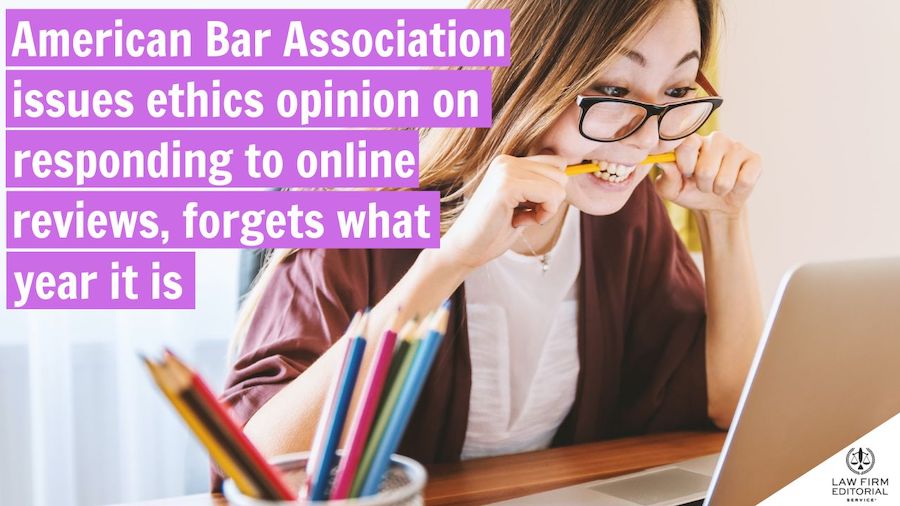Abide by the American Bar Association’s recent ethics opinion on responding to negative online reviews at your peril.
One of the longstanding criticisms of the American Bar Association is that its guidance to lawyers often ignores the current business and economic realities that impact the practice of law.
At times, the ABA’s guidance feels like it would be more appropriate for lawyers practicing in the 1950s.
The ABA’s suggestion in a recent ethics opinion about how to deal with negative online reviews is the latest evidence that this criticism is well-founded.
(Before I go any further, I offer this disclaimer. While lawyers with “direct to consumer” practices like personal injury, criminal law, and family law have traditionally been the kinds of lawyers most focused on online reviews, lawyers of all stripes should be cognizant of the power of reviews and the ethics of dealing with them. For lawyers at large corporate law firms, your time is coming. In the very near future, I expect that we will see more websites focused on reviews of corporate law firms and their lawyers.)
In case you missed it, on January 13, the ABA’s Standing Committee on Ethics and Professional Responsibility issued Formal Opinion 496, “Responding to Online Criticism.” You can view the PDF of the opinion at that link.
(If press releases are more your thing, here is the ABA’s press release announcing the publication of Formal Opinion 496.)
The opinion, all seven pages of it, reminds lawyers that:
Model Rule of Professional Conduct 1.6(a) prohibits lawyers from disclosing information relating to any client’s representation or information that could reasonably lead to the discovery of confidential information by another.
A negative online review, alone, does not meet the requirements of permissible disclosure in self-defense under Model Rule 1.6(b)(5) and, even if it did, an online response that discloses information relating to a client’s representation or that would lead to discovery of confidential information would exceed any disclosure permitted under the Rule.
In others words, “Don’t disclose confidential client information when you respond to negative online reviews.”
So far, so good. There’s nothing controversial about the ABA’s position.
As for what the ABA considers a “best practice” for responding to negative online reviews? That’s where things take a turn for the “Huh?”:
Lawyers should give serious consideration to not responding to negative online reviews in all situations. Any response frequently will engender further responses from the original poster.
Interestingly, the ABA states IN THE NEXT PARAGRAPH that:
Lawyers may respond with a request to take the conversation offline and to attempt to satisfy the person, if applicable. For example, a lawyer might post in response to a former client (or individual posting on behalf of a former client), “Please contact me by telephone so that we can discuss your concerns.”
But back to the ABA’s suggestion that lawyers do not respond to negative online reviews. The ABA does a disservice to its members and lawyers everywhere by advocating for a “no response” strategy here.
In 2021 (and surely for years to come), online reviews strongly impact both a law firm’s SEO rankings and its efforts to convince new clients that the firm is worth contacting regarding the legal issues they’re facing.
Today, not responding to negative online reviews is an implicit concession by the entity being reviewed of the truthfulness of the review.
If you doubt that, look closely the next time you are on a website with reviews, such as Amazon, Google My Business, or Yelp. You will see business owners frequently responding to negative online reviews.
They need to. Otherwise, current and potential customers are likely to look at the negative reviews and take them at face value without thinking about the reviewed business’s side of the story.
After all, that’s undoubtedly what you and I did the last time we read a negative review online.
While the ABA hedges a bit by also suggesting lawyers attempt to respond to negative online reviews offline, I suggest you think carefully about following the ABA’s suggestion that you NOT RESPOND AT ALL to negative online reviews. A single negative review that is not responded to can cost you and your firm clients and significant amounts of revenue for years to come.
If you would like to see good, bad, and ugly examples of lawyers responding to negative online reviews, just take a look at the negative reviews left (purportedly) by clients on Avvo.
You will find some responses by lawyers that make for great templates for your own responses. You will find plenty of others that absolutely would not.
These days, online reviews of you and your law firm are serious business. They can have a material effect on the growth of your law firm.
You should absolutely follow the ABA’s ethical guidance regarding protecting client confidences when responding to negative online reviews.
But I urge you to think twice before adopting the ABA’s suggestion that you not respond to these reviews in the first place.
Bottom line: Abide by the American Bar Association’s recent guidance on responding to negative online reviews at your peril.

